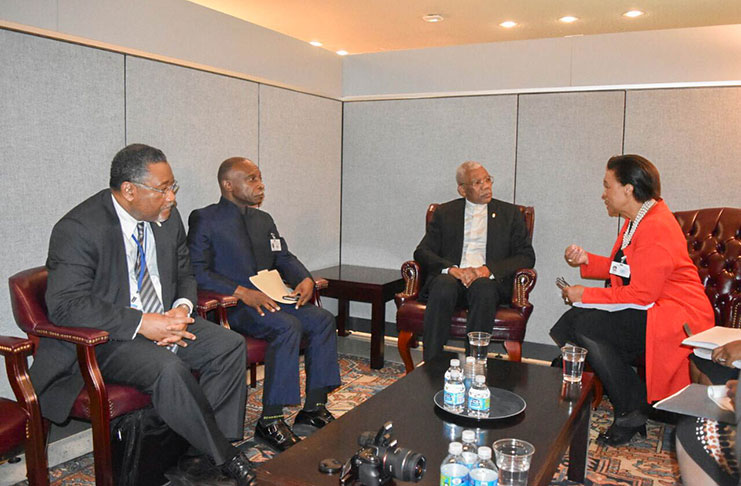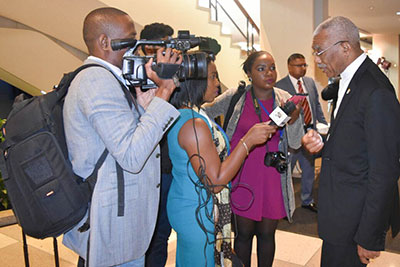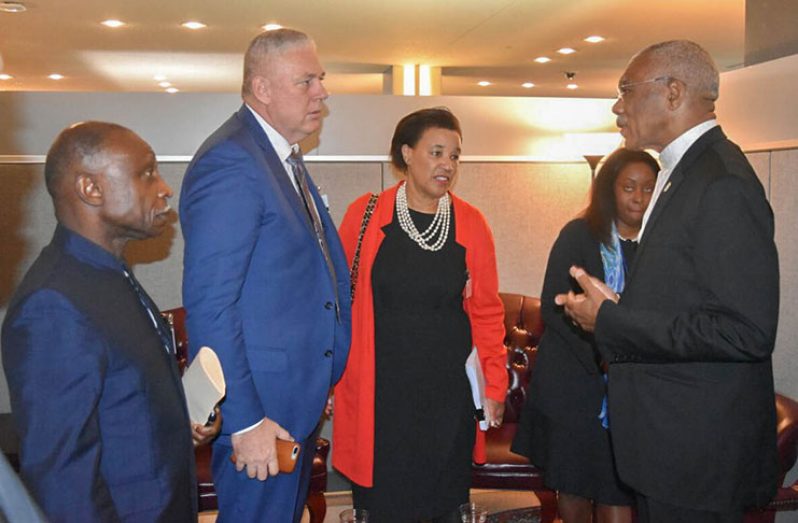-Pres Granger urges more coordinated approach to disaster relief
By Svetlana Marshall in New York
THE devastating impact of the recent series of hurricanes that have ravaged a number of Caribbean Islands and the urgent need to increase efforts to mitigate climate change, were
atop the agenda when President David Granger met with the Commonwealth Secretary-General Patricia Scotland on Tuesday on the sidelines of the 72nd Regular Session of the UN General Assembly (UNGA 72) in New York. And he told Guyanese reporters that the Region needs a bigger disaster relief mechanism.
Minutes after the meeting with the Commonwealth Secretary-General at the United Nations Headquarters in New York, President Granger told journalists that climate change could no longer be ignored, as he pointed to Barbuda that is now unhabitable after being flattened by Hurricane Irma. “In my lifetime, I have never seen such catastrophic series of hurricanes, starting from Harvey to Irma, to Lee to Maria, to Katia. So it is quite clear that climate change is not something that we could ignore,” President Granger said, while noting that the small island states of the Caribbean are very vulnerable.

As result, President Granger said, during his meeting with Scotland, he underscored the importance of placing climate change on the front burner and the need for relief and protection of Caribbean member states, when the Commonwealth Heads of Government Meeting is held in London in 2019.
Additionally, the President stated that there is clearly a need to expand the work of the Caribbean Disaster Emergency Management Agency (CDEMA). “We have to broaden CDEMA, because what is happening now, several countries are being adversely affected at the same time, simultaneously, so it is not sequentially, so we can deal with one country and then the next, everybody saw the picture of Barbuda,” he posited, while also pointing to countries such as Dominica and the British Virgin Islands (BVI) that have also been hard hit.

Attention, he reiterated, must now be placed on providing relief and evacuation, but said the affected should not be moved from one affected country to another.
While relief and evacuation are short-term solutions, medium and long-term solutions should be implemented to reverse the effects of global warming.
“More importantly, we got to think about mitigation, how we are going to prevent climate change at a global scale from affecting small-island developing states and also low-lying developing states, because, Belize, Suriname, and Guyana can also be affected by global warming and rising sea levels,” he told journalists.
Very important role
Guyana, he said, has a very important role to play in in mitigating climate change, and its domino effect. “We are the largest CARICOM state and we have to consider our land space as being the hinterland of the Caribbean; we have to sit down and speak to other Caribbean states to see how this gift maybe could be utilised to give the people in the Caribbean a better life in [the] wake of these disasters,” President Granger explained.
More attention, he emphasised, must be placed on green technologies and environmental measures. For Guyana, extension of the country’s protected areas would be critical in aiding the move to gradually bring global warming under control. “Guyana is the largest CARICOM state and Guyana fortunately is located in the Guiana Shield, which is part of the lungs of the earth, so we would like to intensify our work to contribute to mitigation, to climate adaptation, by extending our protected areas, by protecting our forests, and making sure that Guyana continues to discharge that duty to mankind. Guyana is the best suited of all the CARICOM states to do so and we would like to play our role in that global partnership.”
Contributions
Zooming in on the work being done by Guyana to assist countries plagued by hurricanes, the President admitted that it has been a challenge.
Guyana has doubled its contribution to relief for Caribbean territories affected by Hurricane Irma from US$50,000 to US$100,000.
A Guyana’s Needs Assessment Team headed by Minister of Citizenship Winston Felix is currently on the ground in Antigua coordinating relief for Guyanese nationals affected by Hurricane Irma in a number of Caribbean islands.
He said it is important for Guyana’s response to be a coordinated one, noting that the Government is concerned about the affected Guyanese, particularly those who would like to return home, and those who have lost all of their documents such as identification cards and passports and will need assistance.
“We are committed to CDEMA and sometimes there is a temptation for people to rush it, but you know in places like Barbuda there is no port, there is no authority. So we felt that unless our efforts were coordinated we would not get the best results. No point sending containers there when it can’t be unloaded, or it has stuff that people don’t need, so we are working through CDEMA,” he explained.
President said he could not update the press on the current situation on the ground, given that there has been a serialisation of catastrophe. “It is quite a pity that so many countries have been affected for so long by this continuing serial, and I really hope that it is brought to an end pretty soon.”
The President met with the Commonwealth Secretary-General in the presence of the Permanent Representative of Guyana to the United Nations, Ambassador Michael Ten-Pow and Minister of Foreign Affairs, Carl Greenidge.











